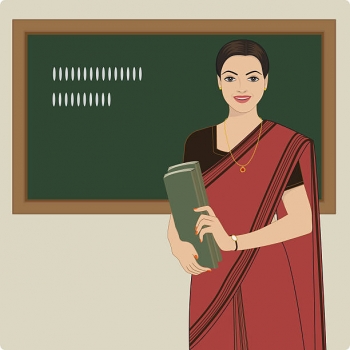
.png) Dr Suresh Mathew
Dr Suresh Mathew

It could be an old cliche: ‘Good buildings don’t make good schools, good teachers do.’ The relevance of this old saying has gained more depth and significance in the modern era of education. Opulent buildings, sprawling campuses, air-conditioned classrooms, swimming pools, horse-riding, smartly dressed students and teachers, and sky-high fees have become the status symbol of schools. In the midst of such mad race for elitism and academic brilliance, the soul of education gets drained out. The making of a complete human being endowed with human values, along with academic excellence, has become the biggest casualty of the modern education. The syllabus-focused education has almost left by the wayside one of the noble purposes of school education: Making of a person intellectually trained, morally upright, service-minded and socially committed.
At a time when frightening reports about youngsters turning into criminals have become the order of the day, one is forced to think what is wrong with their upbringing. When chilling news is emanating day after day of children turning to drug, sex, kidnapping and murder, one has to take a relook at their formation in educational institutions. When the moral fabric is collapsing; respect for others is becoming alien concepts; and classmates are reduced to objects of exploitation, none can turn a blind eye to the alarming scenario. It is time to take a close look at the role schools and teachers can play in showing the children the right path in life. Here comes the necessity of instilling moral values, along with providing academic knowledge, in students.
The teachers do face a herculean task in this regard. They work under pressure to enhance the academic results of students. Their efficiency and proficiency, is weighed on the basis of academic performance of their wards. It is true that they do play a vital role in helping students become successful in career and business. It is no one’s contention that teachers should not focus on academic excellence in a competitive world. But on equal measure, it is their duty to help their students become good human beings who are assets to the society at large. This has become crucial in today’s India where communal disharmony, religious animosity, ethnic divide and regional imbalances are rapidly raising their heads. Teachers can also help students not to fall in the trap of drugs and related issues, through their role as mentors and guides.
Education used to be a mission; those engaged in it, especially the teachers, lived it with a missionary spirit. But, in today’s world, it has become a mere profession, verging on business. It has gained all the trappings of any other business venture. This changed situation has made campuses and classrooms places for grooming students to become professionals devoid of human values. This lack of value system is the reason for students looking at their peers, and others, without love and respect. This deterioration has to be reversed. The classrooms should become zones of solidarity where students respect and appreciate one another irrespective of caste, religion, region or colour. Teachers should become catalysts of this most needed change.